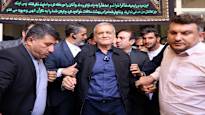Earlier it was reported that the reformist Masoud Pezeshkian is leading in the elections.
The second round of Iran’s presidential election has been won by a reformist Masoud Pezeshkian, says the country’s Ministry of the Interior. According to the election authority, the turnout was around 50 percent.
Earlier, the Ministry of Interior said that the reformist Pezeshkian in Iran is led by an ultra-conservative Saeed Jalilia in the second round of the presidential election.
According to the election authority, Pezeshkian received more than 16 million votes and Jalili around 13 million votes, reports the state-run Irna news agency.
The election was held because the country’s previous president Ebrahim Raisi died earlier this year in a helicopter crash.
Presidential candidates needed the approval of a council of religious scholars to run. In the Islamic Republic, the supreme political power belongs to the supreme leader of the country, Ayatollah Ali Khamenei. The Ayatollah had demanded a higher voter turnout for the second round, emphasizing the importance of the elections.
Building relations with Western countries
Among other things, Pezeshkian has promised more constructive relations with Western countries in order to end Iran’s isolation. The 69-year-old Pezeshkian has also spoken in favor of loosening internet restrictions and opposed police patrols monitoring women’s use of headscarves.
The headscarf caused major protests in Iran in 2022, when a man was arrested for wearing a “wrongly worn” headscarf Mahsa Amini died in the hands of the police.
The more conservative Jalili is known for his anti-Western thinking. He has also objected to Iran starting to negotiate a new nuclear deal with Western countries.
Ahead of Friday’s runoff, Pezeshkian and Jalili took part in two televised debates, during which they discussed low voter turnout, Iran’s economic problems, international relations and internet restrictions.
Although elections are held in Iran, they are not considered fully democratic. The Iranian opposition, and especially its part living outside the country, have demanded a boycott of the elections they consider unreliable.
6.7. at 7:41 am Updated throughout.
